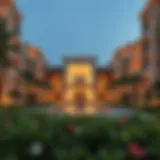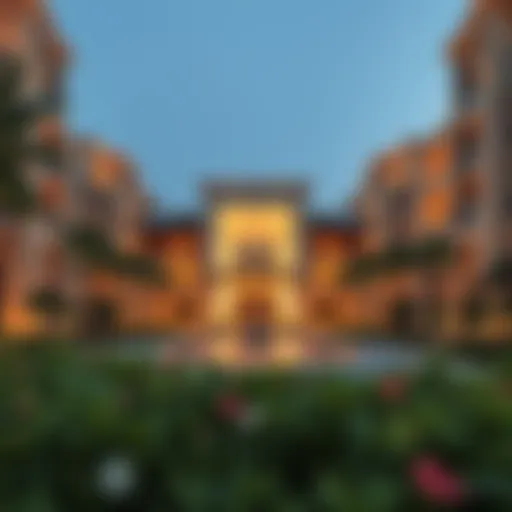Exploring the Souqs of Dubai: A Comprehensive Guide
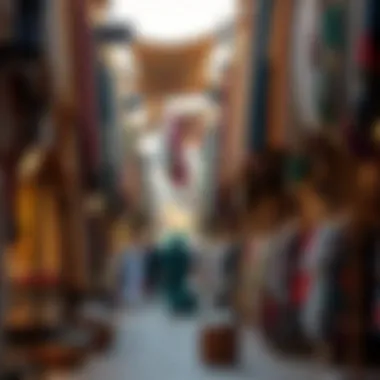

Intro
When you think of Dubai, skyscrapers and luxury shopping malls probably shoot to mind first. But beneath the glitz and glam lies a treasure trove of historic marketplaces, known as souqs. These souqs are more than just a shopping pit-stop; they are the lifeblood of the city, weaving tales of commerce, culture, and community.
From the fragrant spice-laden air swirling around the Spice Souq to the gold gleaming in the Gold Souq, these markets hold significant historical relevance and offer interesting glimpses into the local lifestyle. They've transformed over the years, adapting from traditional trade routes to modern business hubs, yet they maintain their unique charm.
For investors, homeowners, and expatriates keen on understanding Dubai’s real estate landscape, exploring the souqs can be akin to reading a history book while eyeing a promising investment.
In this guide, we’ll wander through the bustling lanes of these markets, examine their cultural significance, and uncover their influence on the economics and real estate opportunities within the UAE. Here, we aim to encourage not just exploration but also potential investment in what is often perceived as merely a tourist attraction. So, let’s get rolling into the heart of Dubai’s souqs and discover the stories they tell through their wares, architectures, and the lively exchanges of haggling that echo through the alleyways.
Prelims to Dubai Souqs
The souqs of Dubai serve as not just marketplaces but vibrant microcosms of the city’s cultural tapestry and economic dynamism. They are where the past and present meet, creating a unique blend of tradition and modernity that captures the attention of both locals and visitors. Understanding the significance of these souqs provides insight into Dubai's identity and its ongoing evolution.
Historically, souqs acted as trading hubs, facilitating commerce and social interaction long before skyscrapers and luxury malls took center stage. They are the lifeblood of the community, fostering a sense of place and history that resonates with those who frequent them or merely pass through. Visitors can expect to find everything from aromatic spices to intricate handicrafts, each item steeped in a rich cultural narrative.
Beyond their cultural value, these markets hold essential economic weight, providing employment opportunities and contributing to the local economy. In addition, as tourists flock to these sites, they boost surrounding businesses and influence real estate dynamics. The mix of traditional and contemporary shopping experiences attracts diverse crowds, from seasoned investors to first-time homeowners looking for unique finds.
In an increasingly globalized world, maintaining such traditional markets is beneficial. They not only preserve cultural identity but also fulfill the demand for authentic experiences that many consumers crave today. The hustle and bustle of a souq is unlike anything offered in sterile shopping malls; it’s an experience in itself. These elements combined make the souqs not only vibrant places for shopping but also relevant touchpoints for understanding Dubai’s economic landscape.
Definition and Historical Context
The term souq (or souk) typically refers to a marketplace, often an open-air venue where various goods are sold. In Dubai, this takes on a lively character filled with vibrant personalities and an array of products. Dating back centuries, these markets originally formed around the trade routes that connected diverse regions. Goods exchanged in these markets ranged from textiles and spices to precious metals and jewelry, reflecting the city's role as a pivotal trading post between the East and West.
During the 20th century, Dubai's rapid transformation began with its oil discovery, which altered not only its economy but also its physical landscape. As the city evolved, some traditional souqs remained popular, while new shopping areas emerged, blending older and newer styles of commerce. Understanding this historical journey is fundamental to appreciating today's souqs, which continue to thrive amid modern advancements.
Cultural Significance
The cultural significance of Dubai’s souqs cannot be overstated. They are vibrant forums where daily life unfolds, and where community members gather to socialize, barter, and trade. Souqs foster a unique sense of belonging and community spirit that often gets lost in the hustle of city life.
You'll find that each souq celebrates its distinct character. For example, the Spice Souk is not only known for its savory scents but also for its role in preserving the culinary traditions of the region. In contrast, the Gold Souk dazzles with craftsmanship and creativity, telling stories of the artisans who have honed their skills over generations. These stories imbue the goods with significance, making purchases akin to buying a piece of history.
Moreover, the connection to cultural heritage is reflected in the architecture of the souqs. Many feature traditional wind towers, arches, and wooden beams, inviting visitors to step into an atmosphere that whispers of a bygone era. By exploring these markets, one gains a deeper appreciation of Dubai's roots and the values embedded in its society. Additionally, the shopping experience in a souq differs from that in conventional stores, as it encourages negotiation and interaction, underscoring the community's social dynamics.
In summary, the souqs hold a prominent place in Dubai’s societal framework, reflecting its rich history and vibrant culture while proving to be invaluable assets to the local economy.
Types of Souqs in Dubai
The landscape of Dubai's marketplace is rich and varied, offering a glimpse into the city's cultural fabric. Understanding the types of souqs helps to appreciate their individual roles in the local economy and community. Each souq is not merely a shopping destination but a historical narrative woven into the tapestry of life in Dubai. Exploring the different categories of souqs—the traditional, modern, and flea markets—gives insight into how commerce and culture intersect in this vibrant city. For anyone interested in investing or residing in Dubai, knowing these distinctions can shed light on consumer behavior and economic opportunities.
Traditional Souqs
Traditional souqs are the heartbeat of Dubai's commercial activity, deeply rooted in the city’s history. These markets are not just places to shop; they are where stories unfold and cultures intermingle. The most famous traditional souqs, like the Gold Souk and Spice Souk, offer a sensory explosion, with rich colors, intriguing aromas, and the hum of bartering voices.
Key Features of Traditional Souqs:
- Cultural Heritage: Many souqs date back decades, sometimes centuries, making them invaluable cultural landmarks.
- Diverse Offerings: Visitors can find everything from spices and textiles to gold and perfumes, often sourced from all corners of the globe.
- Bargaining Culture: Haggling is part of the experience. It’s a dance of negotiation that not only allows for better prices but also fosters relationships between sellers and buyers.
Despite the rise of modern shopping malls, these traditional souqs maintain a loyal customer base. The charm lies in their authenticity, making them essential for any visitor wanting to grasp the soul of the Emirati marketplace.
Modern Souqs
As Dubai evolved into a global metropolis, so did its commercial venues. Modern souqs reflect this transformation, blending traditional elements with contemporary flair. An example is the Souq Al Bahar, which features stylish boutiques and upscale dining, while still capturing the essence of traditional architecture.
Characteristics of Modern Souqs:
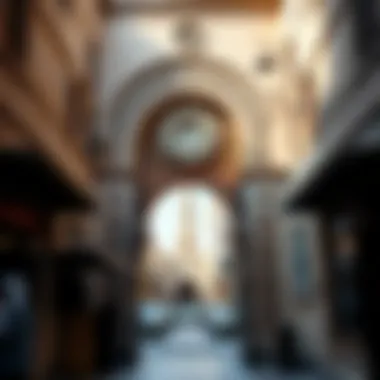

- Technology Integration: Many modern souqs include tech-savvy features, such as interactive kiosks and mobile payment options, catering to a sophisticated clientele.
- Luxury Brands: These markets often host international brands that attract tourists and expatriates looking for the latest trends.
- Dining Experiences: Unlike traditional souqs, modern venues often integrate high-end dining experiences offering diverse culinary options.
These modern markets cater not just to local residents but also to an influx of tourists seeking an all-in-one shopping and leisure experience, forging a unique identity in the global marketplace.
Flea Markets
Flea markets in Dubai present a refreshing twist to the souq scene. They offer a casual atmosphere where visitors can peruse second-hand goods, unique handcrafted items, and vintage treasures. The Dubai Flea Market is a prime example, held regularly in various locations, drawing locals and tourists alike.
Attributes of Flea Markets:
- Eclectic Mix: Shoppers can stumble upon anything from retro clothing to handmade crafts, reflecting Dubai's diversity.
- Community Vibe: These markets often feature live music, food stalls, and local artisans, creating a festive environment where community bonds are strengthened.
- Sustainability: Flea markets promote reuse and recycling of goods, addressing environmental concerns while offering quality products at lower prices.
For those interested in a more personal touch to shopping, exploring flea markets provides not just products but also insights into the lives of the vendors and the local community.
In summary, the different types of souqs in Dubai showcase a spectrum of experiences—from the rich heritage of traditional markets to the sleek offerings of modern souqs and the eclectic treasures found at flea markets. Understanding these varieties helps potential investors, homeowners, and visitors navigate the lively cultural landscape that is distinctly Dubai.
Prominent Souqs to Visit
The souqs of Dubai are not just markets; they are vibrant cultural hubs that embody the spirit of the city. When visiting Dubai, exploring its prominent souqs offers an incomparable glimpse into its heritage and contemporary lifestyle. Each souq serves a distinct purpose, showcasing various local crafts, culinary delights, and rich histories that tourists and residents alike appreciate. This section will guide you through some must-visit souqs, highlighting what makes each uniquely significant and advantageous for those looking to delve deeper into Dubai's marketplace.
Souq Madinat Jumeirah
Overview and Unique Features
Souq Madinat Jumeirah is a prime example of a souq that fuses traditional Arabic architecture with modern amenities. This market sits within the Madinat Jumeirah resort, which mimics a historic Arabian town with its winding canals and stunning waterways. The layout of the souq is designed to make visitors feel like they are exploring a labyrinth of shops, featuring a variety of clothing, handicrafts, and art from the region.
One of the most compelling features of this souq is its scenic environment. Visitors can wander through the intricately designed alleyways, each adorned with traditional lanterns and water features. This makes it a picturesque choice for both shopping and relaxation, allowing patrons to enjoy the ambiance as they peruse stores.
Shopping and Dining Options
In terms of shopping and dining, Souq Madinat Jumeirah boasts a diverse selection that caters to various tastes. Notably, you will find a range of high-quality artisanal goods, from handcrafted textiles to locally produced ceramics. The dining scene is equally impressive, offering everything from street food stalls to fine dining experiences overlooking the waterways.
This mixture of options is beneficial for patrons looking to make a day of it; one can shop for souvenirs in the morning and relish a gourmet meal later. The ambiance combined with the variety of products available makes it a popular choice for tourists seeking an all-encompassing experience in one venue.
Gold Souk
Types of Gold and Jewelry
The Gold Souk represents the golden heart of Dubai's jewelry trade. It is famous for its dazzling displays of gold jewelry and precious stones, attracting luxury shoppers and casual visitors alike. Here, you will find a diverse range of gold types, from 24-karat pieces to intricate designs featuring a mixture of metals and gemstones. This souq stands as a testament to Dubai's opulence, offering products that showcase skilled craftsmanship.
A key highlight here is the sheer variety of styles available. From traditional Arabian designs to modern Western aesthetics, there is something for everyone. The extensive offerings make it not just a market, but an educational experience as well, as visitors get to understand different cultural tastes in jewelry.
Purchasing Tips
Navigating the Gold Souk can be overwhelming, but there are buying tips worth considering. A vital tip is to be prepared to negotiate; bargaining is an expected practice and can lead to significant savings. Furthermore, it’s helpful to be aware of the current gold prices, as this knowledge can ensure fairness in transactions. This familiarity can enhance your buying experience and provide better deals, which can be especially beneficial for those looking to invest in high-value items.
Spice Souk
Oils, Spices, and Herbs
The Spice Souk is a sensory overload in the best way. The air is thick with rich aromas of spices from around the globe, including exotic blends and rare herbs. This market is crucial not only for culinary enthusiasts but also for anyone interested in the cultural history of Dubai, where spices have played a significant role in trade for centuries.
A unique feature of the Spice Souk is the variety of ingredients available, many of which can be found nowhere else. From saffron to sumac, the selection is not only extensive but also deeply rooted in the region’s history of spice trading. Visitors can even find specialty oils and herbs that hold medicinal properties, adding a health aspect to shopping.
History of Trading Spices
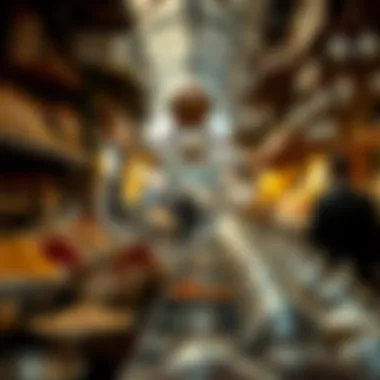

The historical significance of the Spice Souk cannot be overstated. It stands as a remnant of Dubai's rich trade history, allowing visitors to grasp how much spices were once worth, not only in terms of commerce but culturally. This market reflects trends from centuries past, where spices would be exchanged not only as commodities but as a part of cross-cultural connections.
It offers a look back in time, making it a compelling visit for history buffs and curious travelers. The Spice Souk is a perfect convergence of trade, culture, and consumerism, embodying the essence of Dubai’s past and its ongoing importance in today’s market.
Visiting these souqs is more than just shopping; it's delving into the heart of Dubai's culture, where history meets modernity in every stall.
The Economic Influence of Souqs
The role of souqs in Dubai transcends mere shopping; they form a cornerstone of the local economy. This section explores how these vibrant marketplaces contribute economically, focusing on employment opportunities and tourist appeal. Understanding these factors helps us appreciate their significance not only as shopping venues but also as dynamic engines powering Dubai's economic landscape.
Contribution to Local Economy
Employment Opportunities
One of the most noticeable aspects of the souqs is the employment opportunities they create. Vendors and shopkeepers often hire local residents, providing much-needed jobs in retail and hospitality sectors. These positions range from sales associates selling beautiful textiles to personal buyers assisting tourists.
The diverse employment landscape in souqs continues to grow. Souq Al Bahar near the Burj Khalifa is a prime example. It offers a mixture of traditional crafts and modern boutiques, making it a unique hub for both jobs and consumers. The souqs are particularly favorable for unskilled and semi-skilled workers, which helps decrease local unemployment rates. It’s not just the income these roles provide; they also foster community engagement and enhance the local culture.
However, depending solely on these marketplaces could have its downsides. It's vital for job seekers to ensure they’re well aware of the conditions and career growth opportunities available. Many positions are seasonal, linked to tourism peaks, thus requiring workforce adaptability.
Popularity Among Tourists
The popularity among tourists is another significant facet of how souqs influence the local economy. Tourists flock to places like the Gold Souk and Spice Souk, drawn in by the unique, sensory experiences these markets provide. The blend of local culture, authentic products, and the art of bargaining makes shopping in souqs a memorable adventure.
Visitors are not just buying goods; they are engaging in an experience that immerses them in the traditions of daily life in Dubai. This influx of tourists spending in these marketplaces contributes to the overall financial health of the city. They help generate tax revenue and promote local businesses, subsequently keeping the economy thriving.
However, the crowds can lead to congestion and may sometimes overwhelm local vendors. While many merchants benefit, maintaining the balance between tourist interest and local engagement is paramount. Local authorities often discuss how to manage these dynamics effectively.
Impact on Real Estate
The economic contributions of the souqs extend into real estate as well, influencing property values and trends significantly. As the demand for commercial and residential properties grows, so does the real estate market surrounding these bustling venues.
Commercial Property Market
The commercial property market in proximity to souqs has seen a notable upsurge. Areas with high foot traffic benefit from increased visibility and customer engagement, making them attractive for new businesses. For example, a shop near the Spice Souk can experience a surge in customer traffic, compelling landlords to hike prices.
This inflation can impact local budgets and investment decisions, but it also means that business operators have to be clever about managing their costs. While potential profits may appear promising, the initial investment can be substantial, especially in prime locations.
Residential Real Estate Trends
Finally, the residential real estate trends are somewhat intertwined with the accessibility and allure of the souqs. Residents often seek homes close to these markets for their unique charm and convenience. The living experience near popular marketplaces, however, can vary. Some appreciate the vibrancy and constant buzz, while others may find it overwhelming.
As families or businesses decide where to settle down, the proximity to these cultural marketplaces often tips the scales in favor of certain neighborhoods, driving demand and prices up. Nevertheless, it’s essential for potential buyers or renters to weigh the pros and cons of living in lively, bustling areas versus seeking quieter environments outside the prime spots.
Exploring the souqs can offer insights not only into local culture and commerce but also into the ever-evolving real estate scenarios shaped by these beloved marketplaces.
Navigating the Souqs
Navigating the souqs of Dubai is not just about shopping; it’s a journey through the city's rich culture and history. For investors and expatriates alike, understanding how to traverse these markets can open doors to unique opportunities, whether it’s sourcing authentic goods or uncovering investment prospects in surrounding real estate. Each souq has its own character, and knowing the ins and outs can enhance your experience. This section will walk you through the prime times to visit, cultural practices that govern interactions, and strategies for negotiating prices.
Best Times to Visit
Timing can make or break your souq experience. Dubai's souqs are alive with hustle and bustle, but there are moments that are particularly favorable for exploration.
- Early Mornings: The cooler temperatures allow for a more comfortable stroll. Vendors are usually more relaxed, giving you a chance to interact easily.
- Late Afternoons: As the day cools down, the souqs draw in both locals and tourists. It's vibrant, but be ready for larger crowds.
- Weekends: Fridays and Saturdays attract more visitors since many people have their days off. Expect special promotions in several souqs.
- Ramadan Period: Although many places might have reduced hours, visiting during this time can offer a unique cultural insight. Many locals prepare special items, and the ambiance is quite different, infused with festivity.
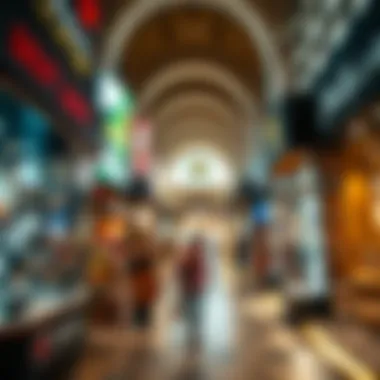

Embrace the rhythm of the souqs; the best times to visit are when the flow of people enriches the experience.
Cultural Etiquette
Navigating the souqs successfully also hinges on understanding local customs. Respect is essential in any cultural setting, and the souqs are no different. Here are some essential pointers:
- Dress Respectfully: While Dubai is relatively cosmopolitan, dressing modestly pays homage to local customs.
- Greetings: A friendly "Salam Aleikum" goes a long way, and matching the vendor's enthusiasm can foster camaraderie.
- Photography: Always ask for permission before snapping photos of people or their stalls. It shows respect for personal space and local customs.
- Follow Local Norms: During prayer times, be mindful of any interruptions in service or visitor traffic. This requires a balance of patience and understanding.
Observing these etiquettes not only enhances personal connections but can also lead to better deals and lasting friendships.
Bargaining Strategies
When it comes to shopping in the souqs, bargaining is part of the game. Mastering this skill is crucial for scoring the best prices. Here are some strategies to consider:
- Do Your Homework: Prior to your visit, get a sense of average prices for items you are interested in. This knowledge sets a strong foundation for negotiation.
- Start Low: Begin bargaining with a price significantly below what you're willing to pay. This creates room for negotiation, allowing both parties to find common ground.
- Be Polite: Approach bargaining with a friendly demeanor. Being aggressive can sour the deal. A smile can work wonders.
- Walk Away Tactics: If you feel the price won't budge, don't hesitate to walk away. Often, vendors will call you back with a better offer.
- Buy in Bulk: Purchasing multiple items in one go often grants leverage for better prices. Vendors appreciate bulk sales, giving you more bargaining power.
Bargaining in the souqs is not just about getting a good deal; it's about engaging with the traders and the culture itself.
Taking the time to understand the best times to visit, the cultural mores involved, and effective bargaining techniques can significantly enhance your experience while navigating Dubai's souqs. Investors, homeowners, and expatriates can find value beyond the prices—into an authentic slice of Dubai life.
The Future of Souqs in Dubai
The landscape of Dubai's souqs is on the brink of transformation. As the city evolves into a leading global hub, the souqs face pressure to adapt while still holding onto their deeply rooted traditions. The future of souqs not only reflects the desire to remain relevant amidst modern consumer habits but also highlights the ongoing commitment to sustainability and cultural preservation. Understanding these elements is crucial for investors, homeowners, realtors, and analysts who are keeping a close eye on Dubai's real estate and commercial opportunities.
Potential Developments
Anticipated developments in the souq sector focus on several key areas, such as expansion, renovation, and diversification of offerings. Here are some noteworthy trends:
- Expansion Projects: Plans are underway to increase the physical footprint of some souqs, adding spaces that can accommodate a greater variety of vendors and attract more visitors.
- Mixed-Use Spaces: Upcoming souq projects are likely to integrate residential and commercial areas, allowing for a more vibrant community atmosphere. This can entice expatriates and locals alike, merging shopping with everyday living.
- Cultural Events and Festivals: Future souqs may place a heavy emphasis on cultural programming, providing platforms for local artisans and musicians, thus stirring community involvement and fostering tourism.
- Sustainability Initiatives: As a response to global environmental concerns, future souqs are expected to adopt eco-friendly practices. This could mean incorporating sustainability into design and operations, such as solar panels and waste reduction systems.
Integration with Technology
The marriage of tradition and technology is a crucial aspect of the future of Dubai's souqs. As digital trends seep into every facet of life, here are some innovations likely to shape these markets:
- E-Commerce Platforms: To keep pace with consumers' growing preferences for online shopping, some souqs may establish virtual marketplaces. This would enable vendors to reach wider audiences beyond the physical space of the souq.
- Mobile Apps: Think of a mobile application that allows visitors to navigate souqs with ease, providing real-time information on deals, vendor promotions, and a chance to connect with artisans directly.
- Digital Payment Solutions: As cash transactions become less favorable, the introduction of cashless payment systems can streamline purchases, making the shopping experience more convenient for local and international clientele.
- Augmented Reality Experiences: In a bid to enhance the shopping experience, some souqs may offer augmented reality tools, enabling customers to visualize products in their home settings or even learn about the product's history as they shop.
These innovations will likely not only modernize the souqs but will also preserve their unique charm and promote continued engagement with a diverse audience. The future of Dubai’s souqs is an exciting intersection of tradition and progress, ensuring relevance in a fast-paced world while honoring the cultural tapestries that make them iconic.
"The souqs of Dubai are not merely markets; they are a reflection of the city's soul, echoing the stories of its past while paving the way for its future."
Finale
The souqs of Dubai embody much more than market stalls; they represent a confluence of experiences, cultures, and economic impact that shape the city. As explored throughout this article, the intricate layers of history and cultural significance surrounding these markets reveal why they stand as essential landmarks in the Dubai landscape. These bustling marketplaces, whether brimming with spices or glittering with gold, tell a story of local heritage and global connectivity.
Recapping Key Insights
When discussing the souqs, one cannot overlook their multifaceted role in Dubai's economy. The economic influence of these markets goes hand in hand with their cultural relevance. Key components of this influence include:
- Employment Opportunities: The souqs provide a livelihood for countless individuals, fostering community development and entrepreneurship.
- Tourism Magnet: Tourists flock to these markets, significantly contributing to the local economy and solidifying the souqs’ places as cultural hubs.
- Real Estate Dynamics: The existence of popular souqs prompts growth in nearby real estate, impacting both commercial and residential settings.
In summary, the souqs not only enrich Dubai's cultural fabric but also fundamentally drive its economy, emphasizing their importance in both present and future landscapes.
Final Thoughts
As we look ahead, the future of the souqs seems poised for an evolution that marries tradition with modernity. The integration of technology within these markets while preserving their authenticity is crucial. Investors, homeowners, and expatriates must recognize the potential these souqs present—not just for economic return, but as vessels of heritage and community.
The dynamism of Dubai's souqs will undoubtedly play a critical role in shaping the urban experience, making them essential to understand for anyone interested in the city's heartbeat. To neglect these vibrant marketplaces is to overlook the essence of what makes Dubai unique. Whether you’re wandering through the Spice Souk, sifting through treasures in the Gold Souk, or simply soaking in the atmosphere, the souqs offer a microcosm of Dubai's wider story.
The souqs are not just shops, they are links between our past, present, and future. Embrace their journey as you navigate this captivating city.
For further insights and historical context, visit Wikipedia’s page on Souqs or read more about the cultural aspects impressed in these markets on Britannica.




